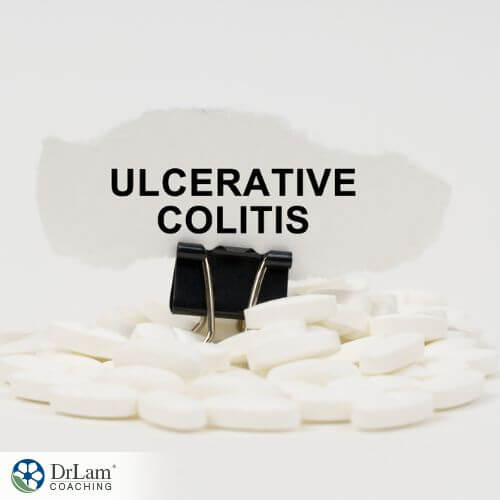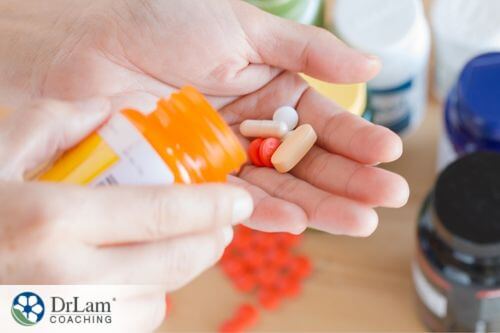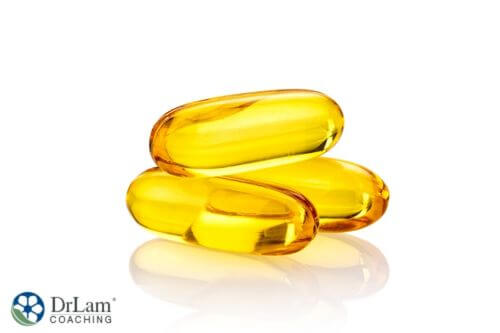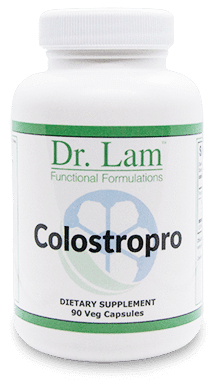 Ulcerative colitis is a chronic inflammatory disease that affects the colon. While the condition has no cure, experts have identified different management options, one of which is supplement use. However, there seems to be a supplement for just about any condition in the United States today. And, as you would imagine, not all of them actually work. This leads to the question: what supplements actually help ulcerative colitis? This article addresses this and more.
Ulcerative colitis is a chronic inflammatory disease that affects the colon. While the condition has no cure, experts have identified different management options, one of which is supplement use. However, there seems to be a supplement for just about any condition in the United States today. And, as you would imagine, not all of them actually work. This leads to the question: what supplements actually help ulcerative colitis? This article addresses this and more.
Ulcerative colitis is a chronic condition where the colon (large intestine) and rectum become inflamed. This condition can cause small ulcers on the lining of the colon, accompanied by bleeding and pus production. Ulcerative colitis is an inflammatory bowel disease (IBD), which is a term that describes a group of disorders that cause chronic inflammation in the intestines.
The other main inflammatory bowel disease is Crohn’s disease. The difference between these two main IBD conditions is that Crohn’s disease can affect any part of the gastrointestinal tract, while ulcerative colitis only affects the colon and rectum.
There are some conditions researchers cannot fully explain the cause, and ulcerative colitis is one of these conditions.
The consensus in the medical world is that the condition is an autoimmune condition. This happens when the immune system treats the body’s own cells as foreign and attacks them.
For ulcerative colitis, the body cells that are attacked are the cells of the colon lining, as well as good gut bacteria. This attack by white blood cells of the immune system causes inflammation of the colon lining. While inflammation in itself is not a bad thing, it becomes detrimental to health when it becomes chronic. This means the body is generating unnecessary inflammatory responses.
One of the primary causes of chronic inflammation in the body is a dysfunction of the NeuroEndoMetabolic (NEM) Stress Response, which is a system tasked with managing stress in the body. The NEM system has six circuits, comprising several organs and systems in the body. The circuit concerned with managing inflammation in the body is the Inflammation circuit, and its dysregulation can cause chronic inflammation.
If there’s consistent dysregulation of any of the NEM circuits, a chronic condition known as Adrenal Fatigue Syndrome (AFS) may result. Adrenal fatigue occurs when the body’s stress response cannot cope with chronic stressors.
Below are the risk factors for the condition:
 The symptoms of this condition can vary among individuals from mild to severe, depending on how severe the inflammation is and the areas of the colon that are inflamed.
The symptoms of this condition can vary among individuals from mild to severe, depending on how severe the inflammation is and the areas of the colon that are inflamed.
It is possible to go an extended period, even up to several months, with no symptoms at all, and this is described as remission. However, this period is often followed by a return of the symptoms, and often worse than before. The term that describes the return of symptoms is a relapse or flare-up.
Common symptoms include the following:
Ulcerative colitis can also cause extra-intestinal symptoms, like:
Your health practitioner may recommend some supplements if you have ulcerative colitis. These supplements are usually necessary to replenish lost vitamins and make up for nutrient inadequacies caused by diarrhea, decreased eating due to appetite loss, and a reduced ability of the body to absorb nutrients. Some of the best supplements that can soothe the condition include:
Typically, people with ulcerative colitis are on corticosteroid medications. While these drugs can help in the management of ulcerative colitis symptoms, they can also interfere with calcium absorption. If an individual has a low calcium count, the body resorts to taking calcium from the bones, weakening them in the process, and leading to osteoporosis.
To combat this, health experts recommend calcium supplements. Ask your healthcare provider how much calcium you should take daily, although the normal daily dosage is between 1000 and 1200 milligrams.
Studies show that individuals with inflammatory bowel disease often have either poor or insufficient vitamin D levels. This is not surprising, as inflammation may interfere with the absorption of vitamin D from food. Vitamin D is essential in the metabolism of calcium and in maintaining healthy bones. Furthermore, research suggests vitamin D may help manage mental health and improve mood.
Ask your healthcare provider the appropriate dose for you, although 800 IU is the typical dose for ulcerative colitis. Also, for the best results, you should take vitamin D with calcium. Interestingly, some experts discourage the use of vitamin D among ulcerative colitis patients, so make sure to confirm with your healthcare provider if you should use this supplement.
Ulcerative colitis can lead to heavy bleeding, and this is always accompanied by a loss of iron. In fact, studies show that up to 76 percent of people with inflammatory bowel disease have iron-deficiency anemia. This results in general tiredness, heart palpitations, and even shortness of breath in severe conditions.
Therefore, your healthcare provider may recommend you take iron supplements. As with all supplements, ensure you confirm with your healthcare provider before taking any supplement and also determine the appropriate dosage for you. This is especially important as overly high doses of iron can be toxic.
 Ulcerative colitis is an inflammatory condition. As such, nutrients that can reduce inflammation and promote healing will be useful in its management. Below are some of these nutrients:
Ulcerative colitis is an inflammatory condition. As such, nutrients that can reduce inflammation and promote healing will be useful in its management. Below are some of these nutrients:
The B vitamins are critical for the generation of energy in the body. These vitamins are also involved in other key processes, like making genetic material. Of the B vitamins, B12 is the most affected among people with ulcerative colitis, especially when there has been surgical removal of the intestines.
When a person has ulcerative colitis, the immune system not only attacks the cells of the colon lining but also “good” gut bacteria. These microorganisms are termed good as they are necessary for maintaining gut health. As a result, health experts may recommend the use of probiotics, which studies have shown to be useful in replenishing good gut bacteria.
One common probiotic is VSL#3, which has become a favorite among many healthcare providers because of its high potency. VSL#3 can be used to manage ulcerative colitis, with studies showing it can induce remission and prevent exacerbations. For best results, you can balance with vitamin E, 100 - 400 IU per day.
However, even though probiotics are freely available in many stores, ensure you speak to your healthcare provider before you commence their use. These supplements contain living microorganisms, so it is critical to find a high-quality supplement that actually contains probiotics. Also, it is important to ensure the supplement will not aggravate your condition.
Ulcerative colitis is an inflammatory condition. It only makes sense that one of the supplements useful in managing the condition is a potent anti-inflammatory supplement: omega-3 fatty acids. One of the best sources of omega-3 fatty acids is fish oil. More specifically, mackerel, herring, tuna, and salmon are excellent sources of omega-3 fatty acids.
 The appropriate dose is between 6 and 15 grams per day, and your health practitioner can help you choose the best dose for you. If improvements are observed after using the fish oil supplement, its dose can be gradually reduced. For even better management outcomes, balance fish oil supplement with vitamin E, 100-400 IU.
The appropriate dose is between 6 and 15 grams per day, and your health practitioner can help you choose the best dose for you. If improvements are observed after using the fish oil supplement, its dose can be gradually reduced. For even better management outcomes, balance fish oil supplement with vitamin E, 100-400 IU.
Studies show that this supplement can decrease colon inflammation and improve ulcerative colitis symptoms. However, some other studies find no benefit to the supplementation of omega-3 fatty acids in ulcerative colitis. Regardless, omega-3 fatty acids are excellent for mitigating inflammation and are helpful for many other health problems as well.
It has also been found that short-chain fatty acids in enema form can be used in the management of distal ulcerative colitis. While there is still a need for more conclusive studies, administering enemas twice daily for about two weeks may help manage the condition.
Dehydroepiandrosterone (DHEA) is an endogenous steroid hormone precursor, with several identified benefits in the body. One study found that the circulating DHEA in the blood of ulcerative colitis patients is low, and increasing this circulating amount could help manage chronic ulcerative colitis. The study was a small one and more studies are needed to have a better understanding of the condition, but DHEA is a promising management option.
If after clinical tests, DHEA is found to be low, health experts recommend a dose of 5-50 mg/day for women, 10-100 mg/day for men.
This herb has anti-inflammatory properties, and is therefore a management option in chronic inflammatory conditions. More specifically, researchers have observed a link between Boswellia gum resin and inflammatory bowel diseases, including ulcerative colitis. In one such study, 20 patients with chronic ulcerative colitis received Boswellia gum resin (900 mg/day for 6 weeks) and another 10 patients received sulfasalazine (3 g/day for 6 weeks). The remission rate was 70% with Boswellia and 40% with sulfasalazine.
Therefore, Boswellia gum resin could be another potential management option for patients with ulcerative colitis.
Colostrum is a pre-milk fluid produced by the mammary glands following childbirth. It contains an abundance of antibodies and antioxidants, which help establish a newborn baby's immune system. Colostrum has recently gained traction as a dietary supplement because it contains enzymes, antibodies, and growth factors not found in other dairy products. The fluid offers life-sustaining immunological and growth factors during the first 24-48 hours after birth (IgG and IGF), which help in healthy mammal growth.
The nutrients present in colostrum supplements can help in the repair and growth of the colon lining. While in adults, the intestines metabolize the beneficial compounds in colostrum before reaching the bloodstream, there is still a local effect on the intestinal lining, improving its integrity, making colostrum a potential management option for ulcerative colitis.
BPC-157 is a synthetic peptide that can activate cells involved in repairing the tissue, stimulate the production of growth factors, and limit inflammation. There haven't been many studies on the use of BPC-157 in humans, but research in rodents and cultured cells shows that the peptide may aid in the repair of tendons, joints, nerves, the intestinal tract, the stomach, and skin. Therefore, BPC-157 is a potential management option for ulcerative colitis.
Beta-glucans are naturally occurring polysaccharides derived from the cell walls of Saccharomyces cerevisiae, commonly known as Bakers' yeast. Studies show beta-glucans are immunomodulating as they can activate innate immune cells. The other part of the supplement, Maitake mushroom, is rich in antioxidants and has also been found to boost immune function. Together, beta-glucan and Maitake mushrooms are useful therapy options in the management of ulcerative colitis.
 Individuals that have ulcerative colitis often struggle to eat healthily. This is because of the discomfort that arises from abdominal cramps and irregular bowel movements, alternating between diarrhea and constipation.
Individuals that have ulcerative colitis often struggle to eat healthily. This is because of the discomfort that arises from abdominal cramps and irregular bowel movements, alternating between diarrhea and constipation.
While it is worth noting that diet does not cause ulcerative colitis, some foods can trigger symptoms in some people or worsen them. Typical examples are lactose and dairy products. While lactose will not necessarily constitute a problem for all ulcerative colitis patients, people that cannot tolerate lactose can exhibit adverse effects.
Aside from lactose, foods that can cause food allergies should be avoided. You know best what foods can cause allergies for you and should stay away from such foods. Other foods that have been implicated in triggering ulcerative colitis include sugary foods and drinks, carbonated drinks, alcohol, high-fat foods, and high-fiber foods.
In contrast, foods that are high in calcium, B vitamins, and vitamin D will be useful in the management of ulcerative colitis.
Ulcerative colitis is a chronic condition that occurs when the colon and rectum become inflamed. The cause of the condition is not known, but the most commonly accepted theory is that it is due to an autoimmune condition. There is no cure for ulcerative colitis, but health experts have identified some supplements that may help. They include:
However, not all supplements are good for everyone, especially if you have another condition like adrenal fatigue. This is why it is critical that you speak to your healthcare provider before taking any of these supplements.
For more information about supplements for managing inflammatory bowel conditions or other health challenges, the team at Dr. Lam Coaching can help. We offer a free, no-obligation phone consultation at +1 (626) 571-1234 where we will privately discuss your symptoms and various options. You can also send us a question through our Ask The Doctor system by clicking here.

Colostrum and probiotics to improve gut function and boost immunity.
Ulcerative colitis can affect people of all ages. However, the condition is most common among people between the ages of 15 and 35. Also, the risk for the condition significantly increases if the individual has had a direct relative with the condition.